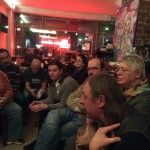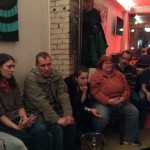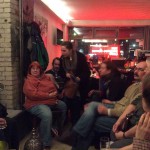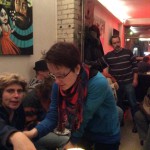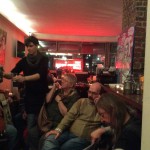Last Friday, at the Hearing Voices Café, conversation with Caroline von Taysen on anti-psychiatry, trialogic psychiatry structures (experiencers, family, health professionals), political nuances and drives of the Hearing Voices movement, England, Kenya, the States; How there is no paradise country for the voice-hearer; the Hearing Voices movement in Germany; psychopharmacy and long term thinking, Trieste, guilt, crisis and life.
Category Archives: Hearing Voices Movement
Next Friday Nov 7, 18:00 at The Hearing Voices Café: Caroline Von Taysen in conversation with Dora García
A little text as introduction:
“How the German Voice Hearing Network Helped me Recover.”
Talk given at the 5th Voice Hearing Conference in Berlin,
21st/22nd of October 2005
First of all I would like to introduce myself. My name is Caroline von Taysen and I am speaking to you as an expert by profession.
I work as a pychologist in different freelance jobs. That is, I do shifts in a crisis intervention house, I visit people with psychiatric experiences in their homes to help them live their daily lives, and I give therapeutic massages.
During this talk I would like to tell you about some of my experiences and insights that I have had since joining the “Netzwerk Stimmenhören” (“Voice Hearing Network”).
I got to the “NeSt” six years ago, right after my university studies.
Parallel to the very mainstream, nature sciences orientated lectures, there were also some critical classes at my university:
The so called “Critical Psychologists” integrate Marxist ideas: they criticize the unquestioned position of power that psychologists and psychiatrists usually claim and try to find alternatives to hierarchically structured institutions.
The “Constructivists” don’t believe in objective realities. They say that instead, we are all in the constant process of creating and recreating our own subjective worlds, according to our perception of things and to the contexts we live in.
I was an enthousiastic follower of these ideas and was looking forward to now, finally, put them into practice.
My ideas were very easy:
the poor victims of the opressive psychiatric system need to be rescued!
I was going to position myself on the side of the psychiatric survivors and fight for their rights!!
I knew that psychotic experience was a phenomenon and not a dysfunction and that pharmacotherapy was one of the tools used for repression.
I was also fascinated by these extraordinary perceptions, such as voice hearing or other hallucinations. I had had similar experiences while taking drugs and had found them very exciting and mind opening.
Anyway, this was the theory.
During my university studies I hadn’t really met anybody with a psychiatric diagnosis, so it was easy for me to hold up my simple beliefs and present them self-confidently.
As soon as my time as a student was over, though, this self confidence diminuished rapidly. Now I was unemployed and didn’t really have a clue about the mental health system in Berlin. I didn’t have concrete ideas of what kind of job I would like to have, in what kind of project I might want to work… I only knew that I demanded a great deal of political correctness of whoever I might be willing to work for.
So what exactly was my role as a psychologist now?
How could I put into practice what sounded so good and easy in theory?
How exactly do I confront people with psychiatric experiences in a correct way?
My theoretical solidarity didn’t help me now.
In this first phase of searching for my professional identity (and these annoying identity crises keep popping up out of nowhere….), I found out about the “NeSt”. A self-help booklet informed about the trialogue groups that take place every two weeks, and I was intrigued. Meeting up regularily with people who hear voices, their relatives and friends, and professionals sounded great.
I remember my first visits in the trialogue group. I was actually quite intimidated by what was going on and realized how little I knew. I remember how I got there once in a short summer dress and was mostly busy with wondering if I was dressed appropriately…
What surprised me mostly was how diverse the people in the group were. So far, I was only used to the pretty homogeneous political groups at the university.
Here, there were people from all kinds of professional and social backgrounds. They had different ages and presented all sorts of opinions.
I was very impressed by the respect that the people showed each other.
The primary rule of the group says that everybody is an expert of his/her own experiences and that everybody’s stories and opinions are to be accepted without judgement. This both inspired and confused me.
So it came that some of my so politically correct opinions started to crumble away… there were voice hearing people who talked about their good experiences with antipsychotic drugs, and some who actually liked going into a psychiatric hospital because it gave them a sense of protection…
How could that be??
There were also those who insisted in being called “ill” and totally didn’t agree with the idea, that their voices could be meaningful in any way.
I remember how I once proclaimed an opinion of mine and Hannelore Klafki asked me to please talk about my own experiences and not about theoretical generalizations. I was sooo embarrassed…. It felt like Hannelore had the role of a professional person, and certainly not me….
This very respectful way of treating each other in a group setting, this mutual taking care of everybody’s limits was something new for me.
Unlike other groups, here nobody put any pressure on anyone, and nobody asked for general positionings.
And most of all, it wasn’t all about finding the right theories, but about sharing our own individual experiences.
What mattered was to actually get to know each other and to learn to better understand everybody’s different perspectives.
What really touched me, that I was also treated that way, even though I was a clueless psychologist.
I felt like I was taken into the group in a very accepting and sympathetic way.
I felt like I was first of all looked at as a human being, as Caroline, and then also as a psychologist.
I also felt like I got as much space and time as I needed to settle into the “NeSt” and find my place there.
This has been, and still is, a very healing experience.
Another primary rule of the “NeSt” has formed me:
one of the methods to better deal with problematic voices is to be the master or mistress of one’s own house, to take control and responsibility of one’s own actions, and not give in to what the voices dictate.
As a student, I had learned about the concept of “empowerment”. This was all about giving power to the psychiatric users and liberating them from their roles as victims. Now I realized what arrogant, and even absurd way of thinking this was! I had never before asked a person, whether she or he wanted to be liberated by me, or actually liberated at all…
I started to learn that it was a contradiction in itsself to condescendingly give someone a position of power…
Today I believe that it is important to differentiate between two different levels:
the political, structural, societal level and the private, individual level.
At the political level I think that it makes a lot of sense to criticize hierarchical structures, to assess what groups are structurally stigmatized and disadvantaged and to support self organization.
At the (inter)personal level this doesn’t work, though, because it would end up in a new kind of paternalism or judgemental expectations.
In a system that exists of priviledged and less priviledged people it is logical that the influence of the “powerful” rises when they “help” the so-called “weak”.
This attitude implicates that “they” need to be helped because “they” can’t help themselves, and thus cements the structurally given victimhood.
To be the mistress of my own house also means for me today, that I want to furnish my own house creatively and freely, without feeling trapped by the boundaries and norms of what is “right” or “wrong” or “successful” or “grown up”….
And it feels great to be liberated from the “one and only politically correct” furniture that can so easily turn into another narrow-minded ideology…!
Finally I would like to say that this non-judgemental and accepting way of being with each other that I have learned, and am still learning, from the Voice Hearing Network helped me most to find out about my house as a psychologist, to renovate the rooms and to find the people I want to invite over.
Obviously there will be a lot of refurbishing to come….
Thank you very much for listening.
Marius Romme, How to solve the schizophrenia problem
Marius Romme
How to solve the schizophrenia problem
6th World Hearing Voices Congress Thessaloniki
Odysseying with the sirens
Congress speech
Thank you so much, hello, will you please stand up not for me, but for yourselves? Stand up and say hello to your neighbor. OK, now thank you very much and sit down, good idea. Now we go on.
Good morning, I was very much impressed by the last speech of Irene. I was very impressed because she said quite rightly: “Don’t give a diagnosis” and that means you do not have, you should not accept a diagnosis. And this is what I am talking about when I talk about “How to solve the schizophrenia problem”. I would also like to thank and congratulate those who organized this congress in times of crisis. This crisis makes people very creative. It has something positive as well. It is great to have the discussion about the emancipation of the Hearing voices movement in this classical culture country, Greece. This fits with the atmosphere where we would like to emancipate hearing voices. Continue reading Marius Romme, How to solve the schizophrenia problem
6th Hearing Voices Congress: Schizophrenia does not exist
Marius Romme speaking at the 6th Hearing Voices Congress 10th – 12th October. How to solve the schizophrenia problem. Marius Romme explains why schizophrenia is an invalid concept for people who hear voices.
7 Questions for Thomas Bock. 14-10-2014, Hearing Voices Café 18.00
(Photo: Jann Wilken)
1- Psychosen ohne Psychiatrie: Do people suffering from psychosis need psychiatry?
2- Hearing Voices without psychiatry. – What is the relation between voices and mental suffering? Is it possible to live happily and fully, and without psychiatry, with voices?
Continue reading 7 Questions for Thomas Bock. 14-10-2014, Hearing Voices Café 18.00
KUNST Krankheit als Metapher
KUNST Krankheit als Metapher
Spannende Therapie: Die Schau mit dem interessanten Beinamen “Das Irre im Garten der Arten” eröffnet im Kunsthaus – und an verschiedenen Außenstationen.
Hören Sie Stimmen? Dann sind Sie im The Hearing Voices Cafévon Dora Garcia genau richtig, das sie am 13. Oktober im Café Traumzeit am Hansaplatz eröffnet. Die spanische Künstlerin beschäftigt sich mit der Bewegung der Stimmenhörer, die sich nicht als Therapeuten, sondern als Bürgerrechtler verstehen und seit den 1970er Jahren gegen die Stigmatisierung des Voice-Hearing als Geisteskrankheit oder Halluzination kämpfen. Continue reading KUNST Krankheit als Metapher
The voice inside, by Paul Baker. No 1: Introduction
The voice inside: A practical guide to coping with hearing voices by Paul Baker.
Introduction
How work on the hearing voices experience has developed.
How did it start?
The first UK Hearing Voices Group was formed in 1988. It began as a small planning group originating in Manchester, inspired by the pioneering work of Professor Marius Romme, a psychiatrist from Maastricht in the Netherlands, and the Dutch self help group Foundation Resonance which was established through this work. Members of the UK group have visited Maastricht many times and attended conferences organised by the Foundation and in return have hosted visits by the Dutch workers. In 1989 the Manchester group organised a speaking tour in the North of England for Marius Romme, Sandra Escher (science journalist) and Anse Streefland (a non-patient voice hearer and Chair of Resonance). The meetings were very well attended by voice hearers, their relatives, and interested professionals. This has become a regular annual visit. Continue reading The voice inside, by Paul Baker. No 1: Introduction
Thoughts on Thought
Hearing Voices: The Histories, Causes and Meanings of Auditory Verbal Hallucinations, Simon McCarthy-Jones, Cambridge University Press, page 362
What is most problematic for the development of any inner speech account of auditory hallucinations is that we still know next to nothing about thought itself. Until we have some idea of the nature of thought and how the brain produces it, it remains very hard to assess how unusual manifestations of it result in auditory hallucinations. How can we know how thoughts relate to voices until we know what thinking itself is like? We have already seen how a traditional corollary discharge account views auditory hallucinations as resulting from efference copy signals from inner speech productions in left Broca’s area not being communicated correctly to the left speech perception regions of the brain, but what other accounts may we consider?






